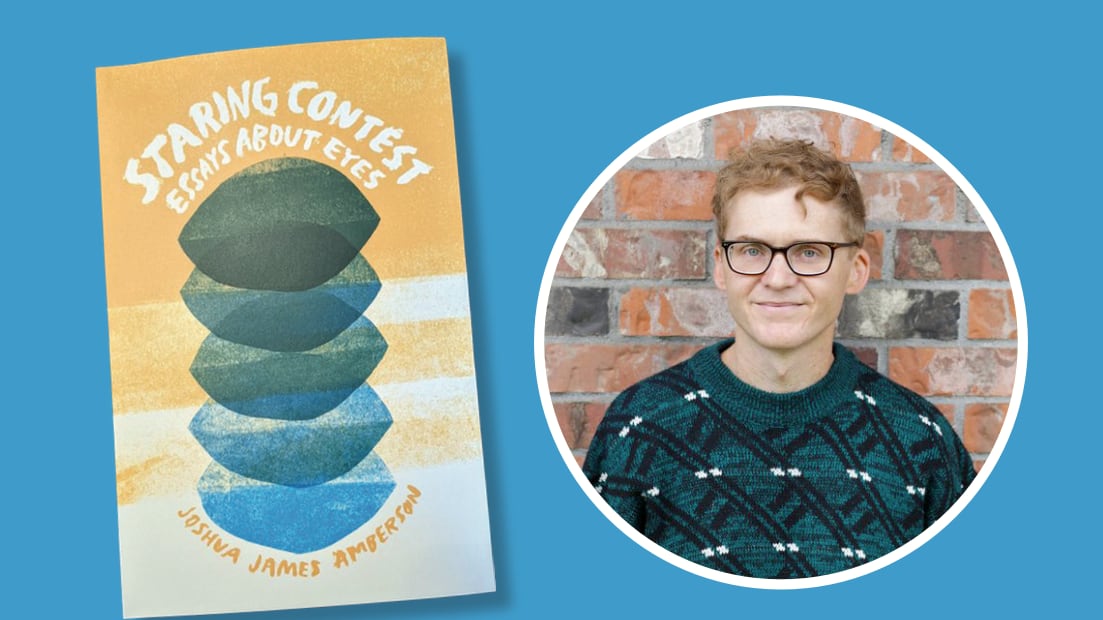“It starts as a mist taking over my world,” reads the start of “Hazy,” the opening essay in Joshua James Amberson’s new collection, Staring Contest: Essays About Eyes (Perfect Day Publishing, 224 pages, $15), which will be published May 16.
The Portland author sits down with me at a cafe in Southeast Portland, where we share a sunny day and a conversation around his new collection. I find myself doing the very thing he writes about, a reflex I can’t help: I look at his eyes.
In the essay “Off-Label,” Amberson writes: “In my daily life, no one ever picks me out as a person with an eye condition. And since I tend not to mention it, it’s likely that most of the people who know me don’t realize the condition is something I deal with or think about every day.”
The condition to which Amberson refers is called pseudoxanthoma elasticum, or PXE, a rare genetic disease that causes cracks in the retina—and, as he writes in “Hazy,” it “allows for the possibility for blood vessels to penetrate the macula, the retina’s most sensitive layer, leaking blood and causing loss of vision.”
Amberson tells the story of when he learned that the distortion in his sight was the result of something more than a need for stronger eyeglasses. “Hazy” details the experience of getting injections in his eyeball, a procedure necessary to prevent further eye damage and to at least temporarily restore and maintain his vision.
In “Off-Label,” Amberson describes the experience of a needle going into your eye as a “strange violation,” and writes that even after having had so many of these procedures over the years, the emotional aftermath hasn’t gotten any easier: “No matter how much I prepare myself, the undirected, unnamable sadness always takes me by surprise.” He has had more than 30 of these injections to date.
“Now that it’s in book form, I think about the collection as a whole differently than I did [when it was in manuscript form]. I’d never had that happen before,” Amberson says, explaining how much the collection changed in the editing process.
One goal that became clearer throughout that process? To start a dialogue. “I see writing as a conversation in some way, whether I’m writing fiction or nonfiction,” he says. “It’s a conversation on the page.”
To bring more experiences into that conversation, Amberson conducted a series of interviews collectively called “One of the Styles of Living.” The interview series features legally blind writers and artists like Keith Rosson, Andrew Leland and M. Leona Godin.
Amberson does not appear directly in these pieces; we don’t see the questions he asks, only the subjects’ answers. These pieces read almost like essays written by the subjects themselves, sharing personal narratives that add further perspective on sight and art.
In one particularly engaging essay from the “Styles of Living” series, the writer and former illustrator Keith Rosson says: “I get the ‘you don’t look blind’ thing a lot. I think it happens with all disabilities: There are degrees of disability, and it’s hard for a lot of people to understand that.”
Amberson wants it to be clear: he is a sighted person and understands that privilege. The “possibility that one day I’ll need constant assistance is still one of my biggest fears,” he confesses in “The Blind Cartoon,” which he says was one of the most difficult pieces to write.
While Staring Contest explores many facets of eye-related subjects—crying, Bette Davis, David Bowie, eyepatches, Mr. Magoo, Braille—the unifying theme here is Amberson’s eager curiosity to understand why vision holds such power, and how we navigate the world with and without it.
SEE IT: Joshua James Amberson appears in conversation with Elena Passarello at Powell’s City of Books, 1005 W Burnside St., 800-878-7323, powells.com. 7 pm Tuesday, May 16. Free.
